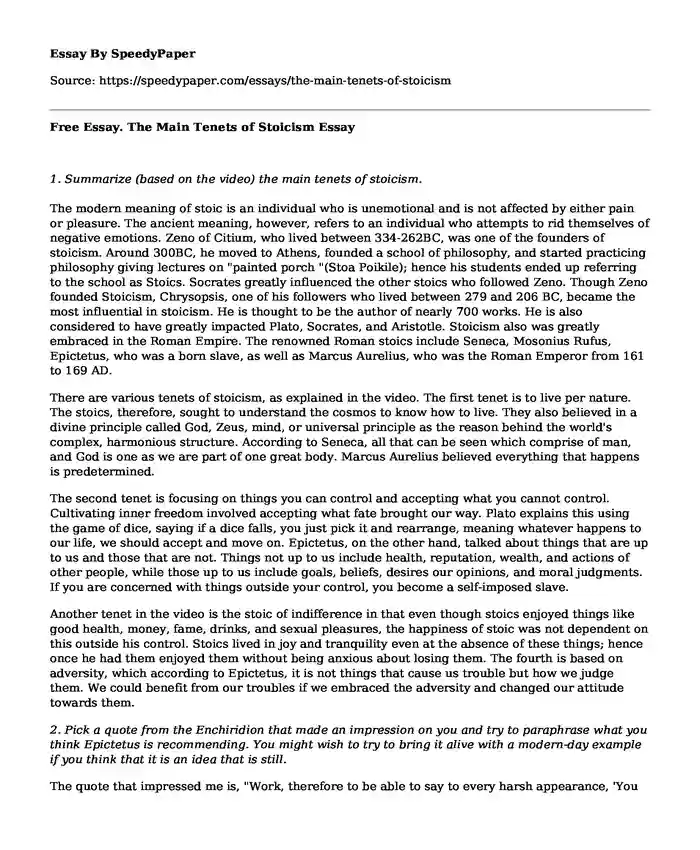
| Type of paper: | Course work |
| Categories: | Philosophy Philosophers Emotional intelligence |
| Pages: | 3 |
| Wordcount: | 822 words |
1. Summarize (based on the video) the main tenets of stoicism.
The modern meaning of stoic is an individual who is unemotional and is not affected by either pain or pleasure. The ancient meaning, however, refers to an individual who attempts to rid themselves of negative emotions. Zeno of Citium, who lived between 334-262BC, was one of the founders of stoicism. Around 300BC, he moved to Athens, founded a school of philosophy, and started practicing philosophy giving lectures on "painted porch "(Stoa Poikile); hence his students ended up referring to the school as Stoics. Socrates greatly influenced the other stoics who followed Zeno. Though Zeno founded Stoicism, Chrysopsis, one of his followers who lived between 279 and 206 BC, became the most influential in stoicism. He is thought to be the author of nearly 700 works. He is also considered to have greatly impacted Plato, Socrates, and Aristotle. Stoicism also was greatly embraced in the Roman Empire. The renowned Roman stoics include Seneca, Mosonius Rufus, Epictetus, who was a born slave, as well as Marcus Aurelius, who was the Roman Emperor from 161 to 169 AD.
There are various tenets of stoicism, as explained in the video. The first tenet is to live per nature. The stoics, therefore, sought to understand the cosmos to know how to live. They also believed in a divine principle called God, Zeus, mind, or universal principle as the reason behind the world's complex, harmonious structure. According to Seneca, all that can be seen which comprise of man, and God is one as we are part of one great body. Marcus Aurelius believed everything that happens is predetermined.
The second tenet is focusing on things you can control and accepting what you cannot control. Cultivating inner freedom involved accepting what fate brought our way. Plato explains this using the game of dice, saying if a dice falls, you just pick it and rearrange, meaning whatever happens to our life, we should accept and move on. Epictetus, on the other hand, talked about things that are up to us and those that are not. Things not up to us include health, reputation, wealth, and actions of other people, while those up to us include goals, beliefs, desires our opinions, and moral judgments. If you are concerned with things outside your control, you become a self-imposed slave.
Another tenet in the video is the stoic of indifference in that even though stoics enjoyed things like good health, money, fame, drinks, and sexual pleasures, the happiness of stoic was not dependent on this outside his control. Stoics lived in joy and tranquility even at the absence of these things; hence once he had them enjoyed them without being anxious about losing them. The fourth is based on adversity, which according to Epictetus, it is not things that cause us trouble but how we judge them. We could benefit from our troubles if we embraced the adversity and changed our attitude towards them.
2. Pick a quote from the Enchiridion that made an impression on you and try to paraphrase what you think Epictetus is recommending. You might wish to try to bring it alive with a modern-day example if you think that it is an idea that is still.
The quote that impressed me is, "Work, therefore to be able to say to every harsh appearance, 'You are but an appearance, and not absolutely the thing you appear to be.'" by this he meant that an individual should focus on their actions since it is what they can control. Focusing on what you cannot control is enslaving yourself since you will be relying on the outside factors for your happiness. He also meant that we only have power over what we do and not what other people do. For example, it is hard to avoid encounters with unpleasant things, but we can bear them without anxiety. For example, you may want the comfort and convenience of owning a car, but if you cannot afford it, you can comfortably live without it.
3. What is your reaction to Pigliucci's description of being a modern-day stoic? Does it appeal to you?
Pigliucci agreed with most tenets of stoic but disagreed with some aspects. For instance, he says that being a stoic does not mean you have become unemotional but rather mean you have feelings, but you reduce irrational and healthy replacing them with rational and healthy feelings. It is appealing to me, and I consider him an important voice in modern stoicism because, rather than lecturing learners on academic philosophy, he gives them practical guidelines regarding the reality of living as a stoic. He also analyses the philosophy of life displayed by stoicism inconsistency with agnosticism, atheism, modern science as well as other forms of religion. He also gives numerous instances where stoic helped him in daily life experiences. Besides, he also gives several examples from other people's lives when stoic behaviors and attitudes led to an emotionally resilient and more fulfilling way of life.
Cite this page
Free Essay. The Main Tenets of Stoicism. (2023, Apr 05). Retrieved from https://speedypaper.net/essays/the-main-tenets-of-stoicism
Request Removal
If you are the original author of this essay and no longer wish to have it published on the SpeedyPaper website, please click below to request its removal:
- This Free Essay Contains Contemplating about Gifted Children with ADHD
- Essay Example about Multi-Organizational Collaborations
- Stress Assessment Essay Example
- Compare and Contrast Essay Sample: Living In a Big City or a Small Town
- Essay Plan and Essay Sample on the Subject of Dementia with Lewy Bodies
- Relationship of Citizenship Race and Immigration in the US
- Black Lives Matter and Inequality - Essay Sample
Popular categories




